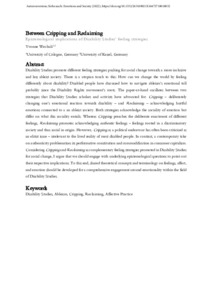Between cripping and reclaiming
| dc.date.accessioned | 2022-05-17T16:36:28Z | |
| dc.date.issued | 2022 | |
| dc.identifier | doi:10.17170/kobra-202205066145 | |
| dc.identifier.uri | http://hdl.handle.net/123456789/13842 | |
| dc.language.iso | eng | eng |
| dc.rights | Urheberrechtlich geschützt | |
| dc.rights.uri | https://rightsstatements.org/page/InC/1.0/ | |
| dc.subject | Disability Studies | eng |
| dc.subject | ableism | eng |
| dc.subject | cripping | eng |
| dc.subject | reclaiming | eng |
| dc.subject | affective practice | eng |
| dc.subject.ddc | 360 | |
| dc.title | Between cripping and reclaiming | eng |
| dc.type | Aufsatz | |
| dcterms.abstract | Disability Studies promote different feeling strategies pushing for social change towards a more inclusive and less ableist society. There is a utopian touch to this: How can we change the world by feeling differently about disability? Disabled people have discussed how to navigate ableism’s emotional toll probably since the Disability Rights movement’s roots. The paper-at-hand oscillates between two strategies that Disability Studies scholars and activists have advocated for: Cripping – deliberately changing one’s emotional reaction towards disability – and Reclaiming – acknowledging hurtful emotions connected to a an ableist society. Both strategies acknowledge the sociality of emotion but differ on what this sociality entails. Whereas Cripping preaches the deliberate enactment of different feelings, Reclaiming promotes acknowledging authentic feelings – feelings rooted in a discriminatory society and thus social in origin. However, Cripping as a political endeavour has often been criticised as an elitist issue – irrelevant to the lived reality of most disabled people. In contrast, a contemporary take on authenticity problematises its performative constitution and commodification in consumer capitalism. Considering Cripping and Reclaiming as complementary feeling strategies promoted in Disability Studies for social change, I argue that we should engage with underlying epistemological questions to point out their respective implications. To this end, shared theoretical concepts and terminology on feelings, affect, and emotion should be developed for a comprehensive engagement around emotionality within the field of Disability Studies. | eng |
| dcterms.accessRights | open access | |
| dcterms.creator | Wechuli, Yvonne | |
| dc.relation.doi | doi:10.1332/263169021X16472718018032 | |
| dc.subject.swd | Disability Studies | ger |
| dc.subject.swd | Behinderter Mensch | ger |
| dc.subject.swd | Diskriminierung | ger |
| dc.subject.swd | Inklusion <Soziologie> | ger |
| dc.subject.swd | Strategie | ger |
| dc.subject.swd | Gefühl | ger |
| dc.title.subtitle | Epistemological implications of Disability Studies’ feeling strategies | eng |
| dc.type.version | acceptedVersion | |
| dcterms.source.identifier | eissn:2631-6900 | |
| dcterms.source.issue | No. 2 | |
| dcterms.source.journal | Emotions and Society | eng |
| dcterms.source.volume | Vol. 4 | |
| ubks.embargo.terms | 2023-04-25 | ger |
| ubks.embargo.end | 2023-04-25 | |
| kup.iskup | false |
Dateien zu dieser Ressource
Das Dokument erscheint in:
-
Publikationen [44]

